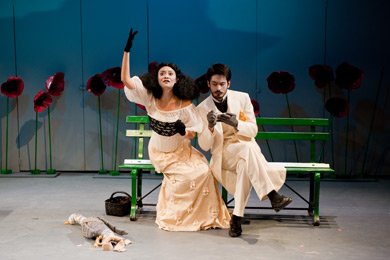
Photo: William P. Steele
By Lehman Weichselbaum
Greenpoint resident Gia Forakis, director
In her new version of The Seagull, X-treme director Gia Forakis destroys Chekhov in order to save him.
Forakis starts with the playwright’s own revisionist label of his work, “a comedy in four acts.” In strictly classical terms, as of course Chekhov knew, a comedy it isn’t, thanks to the devastating gunshot that literally brings down the curtain. But comedic the characters most definitely are, if anything way too much for their own good. Bruisingly funny in their concatenated self-delusions, these complacent landowners, insecure actors and untethered writers bond, idle, feud and generally grasp for any available succor in their socially and esthetically volatile, fin de siecle Russia. They’re so comic it can—and will—kill somebody. It’s a dark irony the playwright devilishly savored.
In her staging for the National Asian American Theater Festival at the East Village’s Theater for the New City, Forakis takes Chekhov at his word and ramps the “comedy” to its most logical and absurdist limits. Thrown to the winds is the familiar nuanced, naturalist treatment of caustic salon politesse and shuffling bohemian ardor in favor of a crazy-broad and starkly choreographed commedia del l’arte vision of steampunk declasse posers kilometers beyond any authentic emotional touchstones. The choice of the National Asian American Theater Company to play a bunch of European Russians, aside from the group’s prodigious performing chops, only heightens the dislocative effect. To bring the point all the way home that this is not your grandmother from Kiev’s Chekhov is the stalking, “angel of silence” presence of the eponymous seagull itself in Bosch-like head and white tux, scored by canned samplings from the likes of Prokofiev, Victor Herbert, Scott Joplin, Ethel Merman and the Village People. “We must have new forms” goes the play’s dubious, celebrated refrain. “You want new forms? I’ll give you new forms,” says the director.
Forakis could have taken her chances with this one-joke conception–if nothing else, it would have yielded the added spectacle of ticketholding purists walking out of the theater–but she pulls a second surprise from her directorial trick bag. It happens well into the final act, when after several pained years’ passing the characters have been bruited back to some semblance of the real. This re-flipping of the Seagull script is no less jolting for coming full circle to the more familiar acting tropes that come with the Chekhov territory. The burden of this everything-old-is-new-again reversal falls most squarely on the shoulders of the two leads, Peter Kim’s Konstantin and Tiffany Villarin’s Nina, and they pull it off with subtle and affecting aplomb, made more so given the burlesque-ish shtick that had marked their roles in all preceding acts.
Structurally considered, Forakis’ one-two punch Seagull has all the sensibility of a dramaturgical pile driver, but she herself shows too many signs of intelligent stage artistry not to know this, or mind that we know. Though in her program notes she acknowledges her source’s underrecognized experimental spirit, Forakis presents a chafed Valentine to the canonical Dr. C, who whatever his avantgarde tendencies always kept his white gloves on even when giving his subjects the back of his hand, who always plays a little too pre-postmodern for our own unfeudal, impatient 21st-century American POV that can’t help but go gloves off at those too-quaint hothouse Russian aristos and their arty attendees. Chekhov wouldn’t like it. But you might.
Leave a Reply